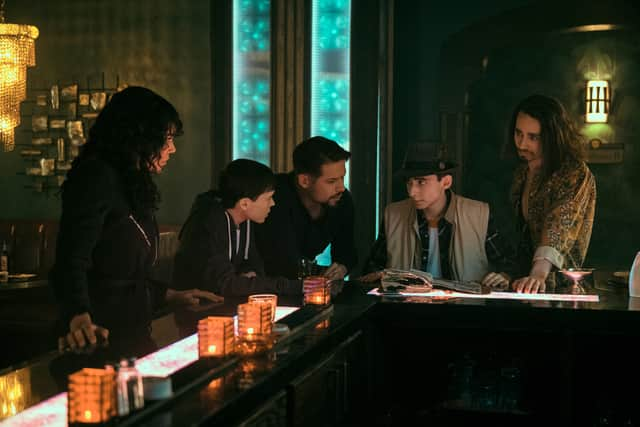The Umbrella Academy season 3 review: Netflix series is a welcome injection of fun amidst superhero fatigue
and live on Freeview channel 276
The Umbrella Academy season 3 arrives as – at a rough estimate – the fifth major new superhero show of the year. If you expand the count to include new seasons of returning shows, that number inflates even further. From now until the end of the year, we can expect several more to follow, with the eventual total for 2022 reaching overwhelming excesses. On the horizon there are, of course, plenty more, with Marvel alone promising (threatening?) the debut of Echo, Secret Invasion, and House of Harkness amongst others across 2023. There are, basically, quite a lot of superheroes about.
It becomes harder and harder, then, for each new superhero show to stand out amongst the deluge. It’s not just a question of what makes them good on their own terms, but what might make them meaningfully and necessarily distinct from any of their predecessors. You can’t swing a cat without hitting a new superhero show – maybe even an animated series about superpowered cats who wouldn’t appreciate being swung around for a rhetorical point – so being good isn’t good enough. Really, just being good is fatal.
Advertisement
Hide AdAdvertisement
Hide AdAt first glance, The Umbrella Academy probably doesn’t look like something that’s guaranteed to feel distinct. The source material, comics written by Gerard Way and illustrated by Gabriel Bá, riff on the basic premise of the X-Men: they feature an eccentric billionaire inventor and his maladjusted superpowered children, opening years after their superhero heyday is behind them to take a sideways look at the genre as a whole. The Umbrella Academy are a far cry from the professionalism of the Justice League or the resources of the Avengers, and in a way that’s essentially the premise. These guys are the rubbish superheroes.
But not, thankfully, a rubbish superhero show. An admittedly inconsistent first season lead into a considerably more engaging second, and Season 3 feels like it’s learned the best lessons from each. The Umbrella Academy is now the best version of itself – fun, witty, and stylish, more comfortable in its quirks and flourishes, and with a stronger sense of how best to use its growing ensemble. More than that, though, its voice feels louder and clearer – easier to hear over the deluge, and worth listening to too.


Season 3 opens in the immediate wake of Season 2’s cliffhanger. The Umbrella Academy averted a nuclear apocalypse in 1963, and returned home after their time trapped in the past. For a moment, everything seemed as though it had been set right – until they come face to face with the Sparrow Academy. Something they changed in the past meant that Reginald Hargreeves adopted different superpowered children, founding the Sparrow Academy rather than the Umbrella Academy. (It’s a shame you don’t get proper television title sequences on Netflix – you just know The Umbrella Academy would’ve had a lot of fun doing a new Sparrow Academy title sequence like that one episode of Buffy.)
Somewhere between step siblings and replacements, the Sparrows are everything the Umbrellas aren’t: more effective and more successful, but harsher and crueller, less of a family than the Umbrellas even at their most divided. As the two teams work to prevent another apocalypse – there’s always another apocalypse – the Sparrows act as something of a mirror to the Umbrellas, one of several ways the show manages to reconsider its big ideas about family. It’s well-trodden ground, both for this show and superhero drama generally, but The Umbrella Academy is smart in its approaches, managing to find new things to say and do along the way.
Advertisement
Hide AdAdvertisement
Hide AdIt helps as well that The Umbrella Academy remains very rooted in its characters, with real thought given to their development across its new episodes. Part of that is about carrying forward the weight of their time in the past – Emmy Raver-Lampman is particularly impressive as Allison, undergoing a stark evolution as she finds herself cut adrift from the lives she’d once built – and part of that is about finding new contexts to place them in. David Castañeda and Robert Sheehan benefit from that a lot, but it’s especially the case for Justin H Min, who gets the chance to reinvent Ben entirely – and clearly relishes it, too.
Ultimately, there’s a lot to like about The Umbrella Academy season 3. Much of it carries forward from previous years, like Tom Hopper’s endearing lack of guile as Luther, Aidan Gallagher’s world-weary cynicism as Five, and Ritu Arya’s sheer charm as Lila. Some of it, like Elliot Page’s take on a more confident Viktor Hargreeves, is new to this season (in that case, actually, it’s one of the season’s best threads). All of it, though, from the cleanly choreographed confrontations – fight scenes or otherwise – to the lively soundtrack contribute to The Umbrella Academy’s own superpower: being able to cut through the superhero fatigue and stand out ahead of the crowd.
The Umbrella Academy season 3 begins on Netflix on Wednesday 22 June, with all episodes available at once. I’ve seen 7 of a total 10 episodes before writing this review. You can read more of our TV reviews here.
Comment Guidelines
National World encourages reader discussion on our stories. User feedback, insights and back-and-forth exchanges add a rich layer of context to reporting. Please review our Community Guidelines before commenting.
